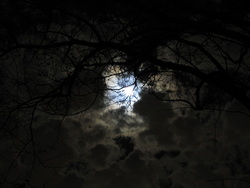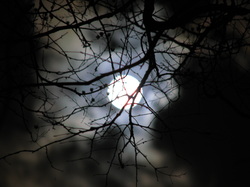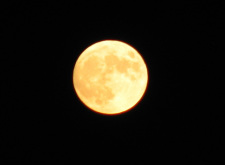 From the time I was in fourth grade until the present, I have worn glasses of some type. When I was first starting a musical instrument my teacher realized I was squinting a lot, so he called my mother and told her I needed to have my eyes checked. It turned out I was really badly astigmatic and near-sighted. Henceforth, I had the proverbial “coke-bottle” glasses. Worse still, every year I would need a new prescription because my eyes seemed to be ever changing. But in the end, however, I loved getting new glasses, or eventually contacts, because when I first put them on the world suddenly was just a bit clearer. I would discover that I had been missing the sharpness and clarity which I thought I had, but truly did not. Years later I was diagnosed with cataracts, (at a young age, I might add). When I finally had the surgery I got a wonderful surprise: it was like that wonderful scene in the Wizard of Oz when Dorothy emerged from the house after it fell from the sky into the Land of Oz. The film went from black and white to glorious color! It seemed like that for me also. I could see things I had never seen before without the aid of glasses. I was like a small child amazed at everything. It was incredible to see with such clarity and vividness without needing correction. The gospel reading for this Sunday, (for those who are coming into the Church at Easter), is the story of the man born blind. It is interesting that at the beginning of the story the disciples are almost as blind as the man who is sitting by the side of the road. They ask if the man sinned or his parents, that he was born blind. That was a common misconception in those days: anyone who was infirm in any way was thought to be that way due to sin. They literally thought God cursed them for being sinful; therefore they looked upon the sick with disdain rather than with compassion. Jesus was not only trying to help the man, but to combat that superstition. He explained that no one sinned, but rather God was going to be made visible through this man. In other words, Jesus, who is the Light of the World, was going to overcome the darkness of unbelief and misconception. Jesus spat on the ground and made mud and put it on the man's eyes. He hearkened back to the Genesis story when God made the first man (and subsequently, woman) out of clay. The blind man was being made whole, and in the end of this encounter it was as if he was re-born. Those who are coming into the Church at Easter will be re-born through the waters of Baptism and empowered with the graces of Confirmation. This gospel has many layers of meaning for them, and for us, too, as we "remember" our Baptism. Jesus uses His spit, creates mud, and then tells the man to wash in the pool called Siloam, which means "Sent." The man is not the same after he rose out of that water, no more than a catechumen is the same after he or she comes out of the waters of Baptism, or the candidate after he or she receives Confirmation. Like the man, they die to sin and rise to new life. They have new sight. That is, they are no longer blind to the grace of God, and they have new life in Christ, just as the man born blind had new life in Christ. In addition, the new Christians are sent forth, just as the rest of us are, with a new mission to live the Christian life, to help build the Kingdom of God. With the new clarity of the graces received they are empowered to do so. The former blind man now had the eyes of faith, unlike the Pharisees who refused to believe. Later, the Pharisees heard Jesus state that He came “so that those who do not see might see, and those who do see might become blind." It obviously struck close to home because the Pharisees then asked, "Surely we are not also blind, are we?" For the reader, it is clear that the Pharisees are indeed blind, not because they cannot see, but because they refuse to see. They would rather stay stuck in their own sin of pride and arrogance; they would rather stay comfortable in their self-made world, then to be freed from the blindness that held them prisoner. For them, it was easier to stay blind!  Sometimes it takes a bit of work to become whole or free. The man in the story had to do something distasteful. Sitting on the side of the road begging was distasteful, but having someone rub mud made out of spit on one's eyes is also distasteful. Having to wash in a pool with everyone watching is more than distasteful; it is embarrassing. But he was open and willing to do what Jesus asked him to do because he wanted to be freed. In the end, he was grateful for the transformation through this encounter, just as any encounter with the living God in a sacrament transforms us. He accepted the fullness of new sight: he believed. What do we have to do to be freed from what holds us back from seeing with clarity? It seems to me, all we have to do is ask and then believe that Jesus will help us with whatever our short sightedness may be. But we may have to do something that seems distasteful or is out of our comfort zone. We may have to forgive, or ask forgiveness; we may have to admit a behavior to God and ourselves and ask for help in combating it. We will have to do the work of letting grace transform us. This story exemplifies the fact that while Jesus has the power to say, “Be healed!” and it is done, often we have to work at something for it to take fullest effect. It means more to us in the end when we have worked with God for freedom. We value it more, but it also shows that we sincerely wanted to change our hearts not just to be free, but to be free to love Him more! In other words, our desire for healing cannot be self-centered. It needs to be so we can know, love, and serve Him better. That is the stance of a true disciple. The challenge is to accept the gift offered us to be freed of whatever holds us back from God, small or large. Will we accept the gift of new sight and new freedom? Or will we be like the Pharisees and refuse to see? Will we refuse to admit to what keeps us from holiness and therefore refuse the grace we need to be freed? Will we be afraid to do the work, or will we let the Lord heal us, even if it means letting go of or changing a behavior? The choice is ours, but it is clear that the Lord deeply desires to heal us and set us free. For many of us the issues are interior ones. Maybe it is selfishness, or impatience, or lack of trust in God, or lack of forgiveness directed at ourselves or another person. Maybe it is an attitude toward another person or a group of people we need to let go of or let be stretched. Maybe it is an unwillingness to spend time in prayer. Whatever it is, God loves us so much that He wants to free us. He does not want to judge us; He wants to love us. The areas of un-freedom within us keep us from receiving that love and therefore from being able to share it with others as fully as we might. So let us enter into this fourth week of Lent asking the Lord to free us anew. Let us ask for our blindness to be healed so that we may see Him all around us, in others, and in our own heart. Let us remember the Pool of Living Water of our own baptismal promises which not only freed us from sin, but empowered us as disciples. May we be healed of whatever keeps us from wanting to grow in freedom and love so we may accept the gifts of the Spirit offered to us! May we be able to see with new clarity the brightness of His love for us and His presence in our world! And may we be a beacon of that light of love towards those around us! Let us continue to meet in the Heart of the Lord who is the Light of the World and the Living Water. Peace!  I took all three photos. The progression is to symbolize the increasing clarity of the gift of sight given to us as we become freer and freer in our spiritual lives. Comments are closed.
|
Heart Speaks to Heart
|

 RSS Feed
RSS Feed

